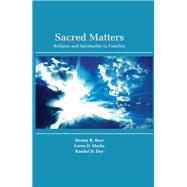- ISBN: 9780203641323 | 0203641329
- Cover: Nonspecific Binding
- Copyright: 4/27/2012
This book reviews and evaluates the multi-disciplinary literature about the relationship between religion and family and proposes a new theory about the aspects of the sacred that are helpful and harmful in families. Related studies and issues from psychology, sociology, anthropology, and religion are examined. The authors hope that their new conceptual framework will stimulate new research and encourage the creation of new intervention programs designed to help families. The book features: A new conceptual framework that provides insight into how, when, and why sacred matters help and hurt families. An examination of the impact of "religious" ideas on family life including forgiveness, sacrifice, prayer, and sanctification. A review of both qualitativeandquantitative research collected in a variety of ways from people with different religious perspectives in different geographical areas. The first chapter introduces the ways sacred processes help and hinder families and the authors'¨‹ new theory. The book then explores the research about forgiveness in families, the role of various forms of asking and seeking help such as prayer and meditation, and how sacrificing in families is helpful and harmful. Next the ways loving behavior helps families flourish and the dysfunctionality that exists in some modern families is explored. Ways of coping with conflict in loving ways such as patience and cooperation, and ways of dealing with negative emotions, are explored in chapters 7 and 8. Next the role of sanctification in families is reviewed followed by a chapter that shows how a generative approach to posterity can be both helpful and harmful. The morality chapter discusses how consistency in values and behavior can be helpful and harmful to families. The psychosocial aspects of religion are explored in chapter 12. A review of the relationship between the authors'¨" theory and other family studies theories is provided in chapter 13. Chapters 14 and 15 examine the tools used in proposing a new theory including the questions to ask and the methods used. Researchers, practitioners, and advanced students in family studies and religion will find this book'¨‹s new theory intriguing. As such it will serve as a supplementary text for graduate and advanced undergraduate courses in religion and families, marriage and family counseling, the psychology of the family and/or religion, the sociology of the family and/or religion, and theory of religion taught in departments of human development and family studies, psychology, religion, marriage and family counseling, pastoral counseling, sociology, and social work.







